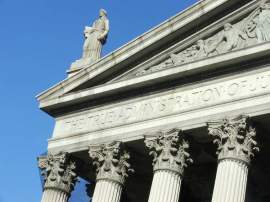
Major Decisions-McCulloch v. Maryland

Popular In Constitution
Purpose Of Lifetime Appointment And Pros And Cons Enumerated Powers Bicameral Legislature Background Article 3 Of The Constitution We The People 1st Amendment Who Wrote The Constitution Judicial Review Equal Protection Clause 5th Amendment 10th Amendment Three Fifths Compromise
McCulloch v. Maryland proved to be an extremely important Supreme Court case which would impact how the laws and the Constitution of the United States would be applied in a functional and effective manner. McCulloch v. Maryland would establish certain principles for interpretation of Constitutional law, specifically dealing with the powers of Congress.
McCulloch v. Maryland would inadvertently become a fundamental case in Supreme Court decisions based on the State of Maryland imposing a tax on the Second Bank of the United States, which was established with the support and backing of Congress. The reason that Congress would establish a national bank would be to control how State banks were to issue currency, which was unregulated at the time it was established.
The states were in opposition of the decision and Maryland would be the first to show its discomfort by levying a tax on all the banks within the State that were not chartered by State legislation. James McCulloch was the presiding official over the Second Bank of the United States in Maryland and refused to pay the tax. What would ensue would have an impact on all judicial and Constitutional matters in the United States after the case was decided.
Originally, the case was heard by the State of Maryland courts and rendered a decision in favor of the State. The decision was reached based upon the determination that the Constitution did not implicitly provide for any provisions regarding banks in the United States, and thus, such powers should be delegated to State to control. The case was then appealed to the Supreme Court, where Chief Justice John Marshall was presiding.
After hearing the case, Marshall would establish the United States Constitution as the supreme rule of the nation. Furthermore, Marshall would also refer to the Constitution to provide for the fact that even though the term "bank" is never explicitly referenced in the document, there are certain provisions in the Taxing and Spending Clause that would provide for implied powers to Congress to establish such a bank.
The establishing of a bank would be a means to implement the expressly given powers to Congress, thus within the realm of Constitutionality. The Necessary and Proper Clause of the Constitution would be invoked to further support this determination and would find that Congress could enact such a practice as long as it did not violate other Constitutional standards and within the realm of Congress' limits.
Two major principles would be derived by Marshall's decision in favor of McCulloch. Firstly, the Congress of the United States is granted for certain implied powers by the Constitution that are implemented in order to ensure for the proper function of the Federal Government. The other major outcome was that the States cannot impose on the powers granted by the Constitution to the Federal Government by any action, such as levying a bank tax on a national bank.
Aside from establishing implied powers of Congress as a legitimate practice, it is the bank tax levied by Maryland that would further make the decision more important, which would prove for the limit on the states' power over Federal Government. Furthermore, Marshall would declare the Maryland bank tax unconstitutional, which was first done in Marbury v. Madison![]() . The case would provide for the Constitution to be interpreted on a broader scope, rather than adhering to its provisions and text word for word. If you need legal advice and assistance, contact Maryland lawyers.
. The case would provide for the Constitution to be interpreted on a broader scope, rather than adhering to its provisions and text word for word. If you need legal advice and assistance, contact Maryland lawyers.
NEXT: Major Decisions-Miranda v Arizona





















